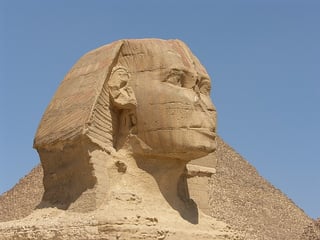
One of the best ways to prepare for the DBQ (the “document-based question” on the AP European History, AP US History, and AP World History exams) is to look over sample questions and example essays. Doing this will help you to get a sense of what makes a good (and what makes a bad) DBQ response.
That said, not all DBQ essay examples are created equal. We’ll briefly cover what makes a good DBQ example and then provide a list of example essays by course. Lastly, we’ll give you some helpful tips on how to best use sample essays in your own preparation process.
What’s a Good DBQ Example?
Without a doubt, the best sample resources come from the College Board. This is because they are the ones who design and administer the AP exams. This means the following:
-
Any DBQ essay example that the College Board provides will include a real DBQ prompt
-
All samples are real student responses from previous years, so you know they were written under the same conditions you’ll have when you write your DBQ—in other words, they’re authentic!
-
They not only have scores but also explanations of each essay’s score, in accordance with the rubric
-
Each prompt includes several sample essays with a variety of scores
Some DBQ examples outside those available from the College Board might be worth looking at, particularly if they highlight how a particular essay could be improved. In general, though, a superior example will do the following:
-
Include the prompt and documents: It will be much easier for you to see how the information from the documents is integrated into the essay if you can actually look at the documents themselves!
-
Have a score: Seems simple, but you’d be surprised how many DBQ examples out there in the uncharted internet don’t have one. Without a real, official score, it’s hard to gauge how trustworthy a sample actually is.
With that in mind, I have compiled lists, organized by exam, of high-quality example DBQs below.

Don’t spend all your study time sharpening your pencil.
Every DBQ Example Essay You Could Ever Need, by Exam
Here are your example essays! We’ll start with AP US History, then move to AP European History, and finally wrap up with AP World History.
AP US History: Official College Board Examples
The APUSH test was redesigned in 2015 and again in 2018, so right now there are right now only five official College Board sets of sample essays you can use in your studies. Make sure to give yourself a 15-minute reading period and 45 minutes to write your answer. In addition, don’t forget to use the current scoring guidelines when grading your own practice responses.
If you want additional sample question sets, you can look at older College Board US History DBQ example response sets. To look at these, click “Free-Response Questions” for a given year. For the corresponding DBQ examples and scoring guidelines, click “Sample Responses Q1.”
Note that these examples use the old rubric (which is integrated into the Scoring Guidelines for a given free-response section). General comments on the quality of the essay, outside information, and document analysis still apply, but the score is on a 9-point scale instead of the current 7-point scale, and some of the particulars will be different. Older DBQs had up to 12 documents, while the current format has seven documents.
If you do look at older DBQ examples, I recommend using the current rubric to re-grade the essays in the sample according to the 7-point scale. I’ll also give more advice on how to use all these samples in your prep later on.

Mr. Bald Eagle is an AP US History DBQ grader in his spare time.
AP European History: Official College Board Examples
Unfortunately, there aren’t as many sample resources for the AP Euro DBQ compared to the other AP history tests because 2016 was the first year the AP Euro test was administered in the new format. Since then, more minor changes have been made in terms of time (you now have an hour on the DBQ) and individual parts of the rubric (you can view the current scoring guidelines here).
This means there are only four sets of official samples graded with the current 7-point rubric:
The rest of the existing available samples were graded in the old 9-point format instead of the 7-point format implemented in 2016.
In the old format, there were 6 “core” points and 3 additional points possible. The old rubric is integrated with the sample responses for each question, but we’ll highlight some key differences between the old and current formats:
-
With the old format, you were given a brief “historical background” section before the documents
-
There were more documents—up to 12—but the current format has seven
-
There was an emphasis on “grouping” the documents that is not present in the current rubric
-
There was also explicit emphasis on correctly interpreting the documents that is not found in the current rubric
While the essential components of the DBQ are still the same between the two test formats, you should definitely refer to the current rubric if you decide to look at any old AP European History samples. You might find it useful to look at old essays and score them in accordance with the current rubric.
Here are the old sample DBQ questions and essays, organized by year:
You can get samples in the old format all the way back to 1999 from the College Board. (Click “Free -Response Questions” for the questions and “Sample Response Q1” for the samples.)

Consider how you might integrate this castle into the DBQ that is your life.
AP World History: Official College Board Examples
The World History AP exam transitioned to a new format to more closely resemble AP US History and AP European History for the 2017 test. This means that there are only three past exams available that use the current DBQ format:
Note that starting with the 2020 exam, AP World History will only cover the years 1200 to the present instead of thousands of years of history. As a result, both the course and exam have been renamed AP World History: Modern (a World History: Ancient course is in the works). What this means for you is that previous DBQs might have to do with time periods you’re no longer required to study, so just keep this in mind.
In the old format, there were 7 “core” points and 2 additional points possible. The old rubric is integrated with the sample responses for each question, but we’ll highlight some key differences between the old and current formats:
-
There were more documents—up to 10—but the current format has seven
-
There was an emphasis on “grouping” the documents on the old rubric that is not present in the current rubric
-
There was also explicit emphasis on correctly interpreting the documents that is not found in the current rubric
- In the old rubric, you needed to identify one additional document that would aid in your analysis; the new rubric does not have this requirement
The essential components of the DBQ are still the same between the two formats, though you should definitely look at the current rubric if you study with any old AP World History questions and samples. You might find it useful to look at the old essays and score them according to the current rubric.
Here are old AP World History questions and DBQ sample responses, organized by year:

Don’t worry, the old format isn’t as old as this guy right here.
One of the single most important parts of your college application is what classes you choose to take in high school (in conjunction with how well you do in those classes). Our team of PrepScholar admissions experts have compiled their knowledge into this single guide to planning out your high school course schedule. We’ll advise you on how to balance your schedule between regular and honors/AP/IB courses, how to choose your extracurriculars, and what classes you can’t afford not to take.

How Should I Use DBQ Examples to Prepare?
Now that you have all these examples, what should you do with them? In this section, we’ll give you some tips on how to use example DBQs in your own AP history prep, including when to start using them and how many you should plan to review.
What Should I Do With These DBQs?
Official sample essay sets are a great way to test how well you understand the rubric. This is why we recommend that you grade a sample set early on in your study process—maybe even before you’ve written a practice DBQ.
Then, when you compare the scores you gave to the official scores and scoring notes given to the samples, you’ll have a better idea of what parts of the rubric you don’t really understand. If there are points you are consistently awarding differently than the graders, you’ll know those are skills you’ll need to work on.
Keep giving points for the thesis and then finding out the sample didn’t get those points? This tells you to work more on your thesis skills. Not giving points for historical context and then finding out the AP grader gave full credit? You need to work on recognizing what constitutes historical context according to the AP.
Check out my tips on building specific rubric-based skills in our guide on how to write a DBQ.
Once you’ve worked on some of those rubric skills you’re weaker in, such as evaluating a good thesis or keeping track of how many documents were used, grade another sample set. This way you can see how your ability to grade the essays like an AP grader improves over time!
Obviously, grading sample exams is a much more difficult process if you’re looking at examples in an old format. The old scores as awarded by the College Board will be helpful in establishing a ballpark—a 9 is still going to be a good essay using the current 7-point scale—but there may be some modest differences in grades between the two scales. (For example, maybe that perfect 9 is now more like a 6 out of 7 due to rubric changes.)
For practice grading with old samples, you might want to pull out two copies of the current rubric, recruit a trusted study buddy or academic advisor (or even two study buddies!), and have each of you re-grade the samples.
You can then discuss any major differences in the grades each of you awarded. Having multiple sets of eyes will help you determine whether the scores you’re giving are reasonable, since you won’t have an official 7-point College Board score for comparison.
Looking for help studying for your AP exam?
Our one-on-one online AP tutoring services can help you prepare for your AP exams. Get matched with a top tutor who got a high score on the exam you’re studying for!

How Many Example DBQs Should I Be Using?
The answer to this question depends on your study plans.
If it’s six months before the exam and you plan on transforming yourself into a hard diamond of DBQ excellence, you might do practice grading on a sample set every few weeks to a month to check your progress to being able to think like an AP grader. In this case, you would probably use six to nine official sample sets.
If, on the other hand, the exam is in a month and you’re just trying to get in some extra skill-polishing, you might do a sample set every week to 10 days. It makes sense to check your skills more often when you have less time to study because you want to be sure that you are focusing your time on the skills that need the most work. For a short time frame, expect to use somewhere in the range of three to four official sample sets.
Either way, you should be integrating your sample essay grading with skills practice and doing some practice DBQ writing of your own.
Toward the end of your study time, you could even integrate DBQ writing practice with sample grading. Read and complete a timed prompt and then grade the sample set for that prompt, including yours! The other essays will help give you a sense of what score your essay might have received that year and any areas you might have overlooked.
There’s no one-size-fits-all approach to using sample sets, but in general they are a useful tool for making sure you have a good idea what the DBQ graders will be looking for when you write your own DBQ on test day.

Hey, where can we find a good DBQ around here?
Closing Thoughts: Example DBQs for AP History Tests
Example DBQ essays are a valuable resource in your arsenal of study strategies for the AP history exams. Grading samples carefully will help you get a sense of your own blind spots so you’ll know what skills to focus on in your prep.
That said, sample essays will be most useful when integrated with your own targeted skills prep. Grading 100 sample essays won’t help you if you aren’t practicing your skills; rather, you’ll just keep making the same mistakes over and over again.
Make sure you aren’t using sample essays to avoid writing practice DBQs either—you’ll want to do at least a couple, even if you only have a month to practice.
And there you have it, folks. With this list of DBQ examples and tips on how to use them, you are all prepared to integrate samples into your study strategy!
What’s Next?
Still not sure what a DBQ is? Check out my explanation of the DBQ to learn the basics.
Want tips on how to really dig in and study for AP history tests? We’ve got a complete how-to guide on preparing for and writing the DBQ.
If you’re still studying for AP World History, check out our top AP World History study guide, or get more practice tests from our complete list.
Want more study material for AP US History? Look into this article on the best notes to use for studying from one of our experts. Also, read our review of the best AP US History textbooks!
Want to improve your SAT score by 160 points or your ACT score by 4 points? We’ve written a guide for each test about the top 5 strategies you must be using to have a shot at improving your score. Download it for free now:


Source: blog.prepscholar.com